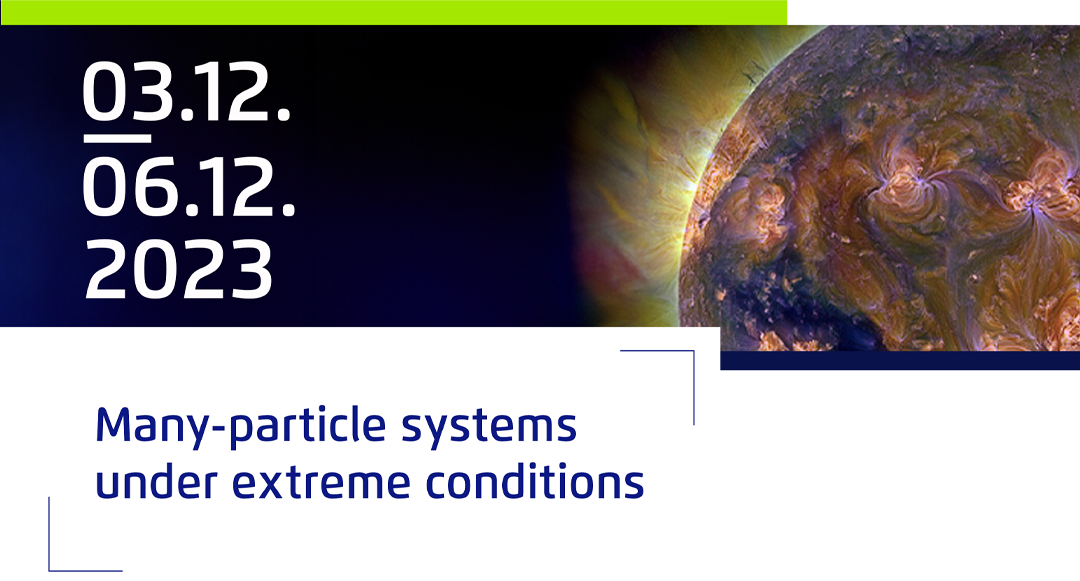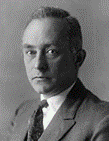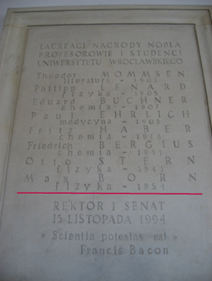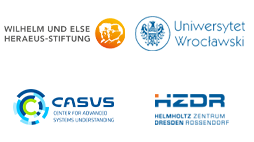
The workshop aims at establishing a cooperation between groups in Poland and Germany working in the field of "many-particle systems under extreme conditions", based on the complementarity of their methodic expertise and fields of application.
The Wroclaw team is specialized on quantum field theory (QFT) based methods of deriving the equation of state (EOS) of strongly interacting matter, with the quark-hadron phase transition (PT) and the phase diagram of quantum chromodynamics (QCD) as main objectives. Their applications concern the description of particle production in heavy-ion collisions, the simulation of core-collapse supernovae and neutron star mergers as well as constraining the nuclear EOS from observations of static properties of neutron stars. The goal is to pin down the line of (pseudo-) critical temperatures in the QCD phase diagram and to locate the possible critical endpoint of first-order PTs and color superconducting quark matter phases.
The HZDR-CASUS team develops powerful modern simulation techniques and density functional theory for many-particle systems to study correlations in warm, dense plasmas which are benchmarked by Path-Integral Monte-Carlo (PIMC) simulations. Applications concern inertial fusion plasmas and interiors of giant (exo-) planets. Machine learning tools (MALA code) have been developed that are provided for interdisciplinary use.
The HZDR-ITP team studies with mainly analytic methods fundamental non-equilibrium phenomena such as the instability of the vacuum against pair creation and birefringence in strong (laser) fields. Astonishing similarities are found with phenomena in quite different disciplines like ultra-cold atomic gases, ions in traps and electrons and phonons in solids.
Other teams from Poland and Germany working in the field of the symposium are invited to participate and to share their expertise in oral or poster presentations.
Wilhelm und Else Heraeus Stiftung
The Wilhelm and Else Heraeus Foundation is a non-profit foundation under civil law for the promotion of research and education in the field of natural sciences, especially physics. It was established in 1963 by Dr. Wilhelm Heinrich Heraeus (1900 - 1985), a grandson of the founder of W. C. Heraeus GmbH in Hanau (today: Heraeus Holding GmbH), and his wife Else Heraeus (1903 - 1987). Since the mid-1970s, the Foundation has worked closely with the German Physical Society (DPG). Among physicists, the Wilhelm and Else Heraeus Foundation enjoys a high reputation. It is considered the most important private funding institution in the field of physics in Germany.
The purpose of the Wilhelm and Else Heraeus Foundation, as defined by its constitution, is to promote research and education in the field of natural sciences through direct and indirect activities. The Foundation is active both operationally and in a promotional capacity.
- Promotion of the scientific exchange of ideas in specialist conferences and binational seminars
- Promotion of gifted students in their education
- Promotion of the further development of teaching and training
- Grants to tax-privileged institutions for the financing or co-financing of projects that serve research and teaching purposes
- Individual projects that serve basic research and the dissemination of its findings, such as visiting professorships, endowed professorships, awards and study assignments on topics of particular social importance
Click here for more information: https://www.we-heraeus-stiftung.de/english/
Max Born Symposium
Since 1979, the Institutes of Theoretical Physics at the Universities in Wroclaw and in Leipzig organized jointly two seminars per year, alternating between Leipzig and Wroclaw, as part of a collaboration program.
After the changes in Eastern Europe, 1991-2019, the seminars were continued as Max Born Symposia: 3-day International Mini Conferences, organized by the Institute of Theoretical Physics of the University of Wroclaw, often with Proceedings in Journals or edited by leading Publishers. Max Born’s name was chosen, as this Nobel Prize winner was born and educated in Wroclaw. He attended the Gymnasium there and started his studies at the local University.
 (Max Born 1882-1970)
(Max Born 1882-1970)
Topics were chosen from the main research directions of the Institute of Theoretical Physics:
- String theory, quantum gravity and cosmology
- Quantum field theory and mathematical physics
- Theoretical particle physics and astrophysics
- Statistical physics and applied computer science
In 2020, during the first institutional contacts between the Helmholtz Zentrum Dresden-Rossendorf, its CASUS Institute in Görlitz and the University of Wroclaw, it was decided that the format of Max Born Symposia shall be used to organize annual 3-day meetings to be hosted either in Wroclaw, Görlitz or Dresden. The first Symposium of this new kind was organized during the CASUSCON Conference in Wroclaw in July 2022.

(Memorial plaque for Nobel Laureates, Wroclaw University Main Building )
The Center for Advanced Systems Understanding
In 2019, a vibrant and productive science hub has emerged on the German-Polish border. The Center for Advanced Systems Understanding (CASUS) uses cutting-edge digital methods to tackle research in complex systems such as the climate, extreme states of matter, or carcinogenesis. The young research center is establishing itself with an increasing number of high-profile publications and close collaborations with renowned partners worldwide.
Based on the belief that future research is interdisciplinary and data-driven, CASUS positions itself as a strong partner in the digitization of science and draws new scientific connections to address future challenges with the help of digital scientific solutions. Combining methods from mathematics, systems theory, data science, and scientific computing at a single location, researchers at CASUS aim to rethink data-intensive systems research.

